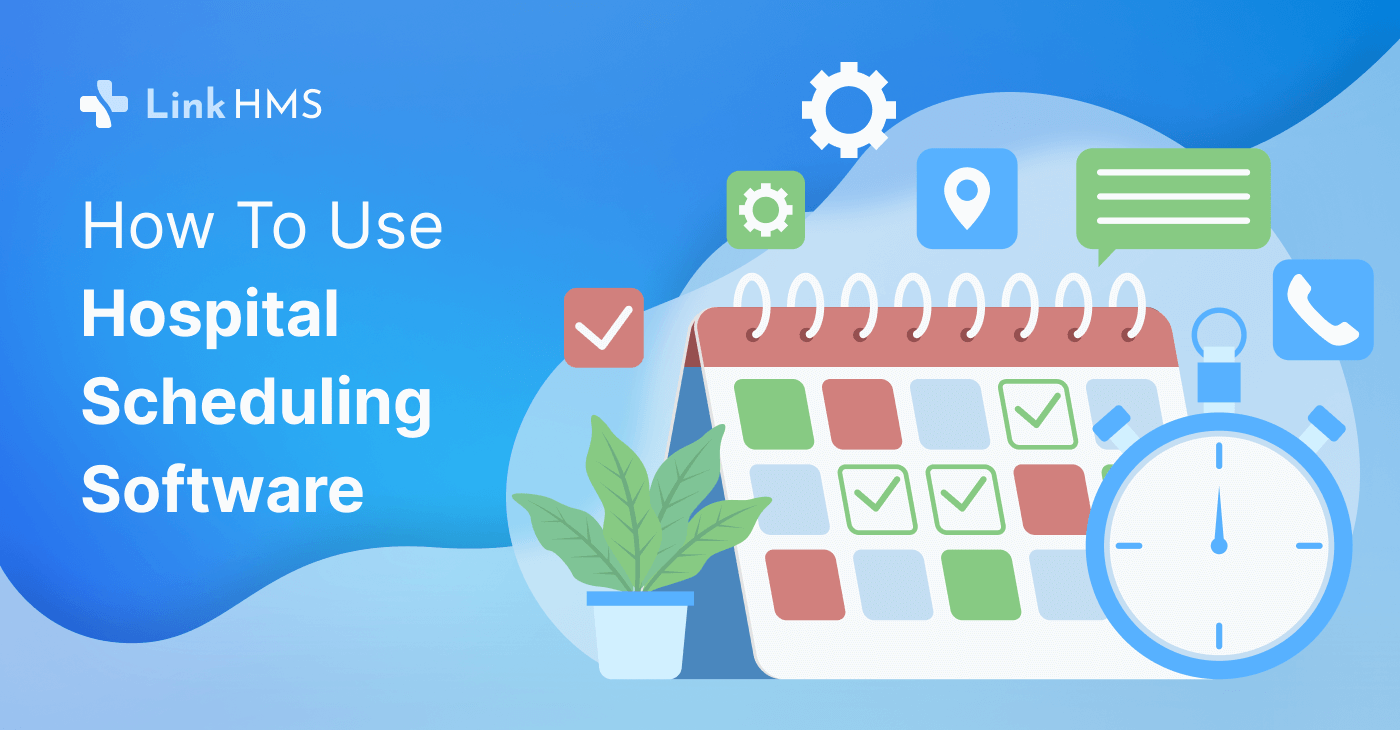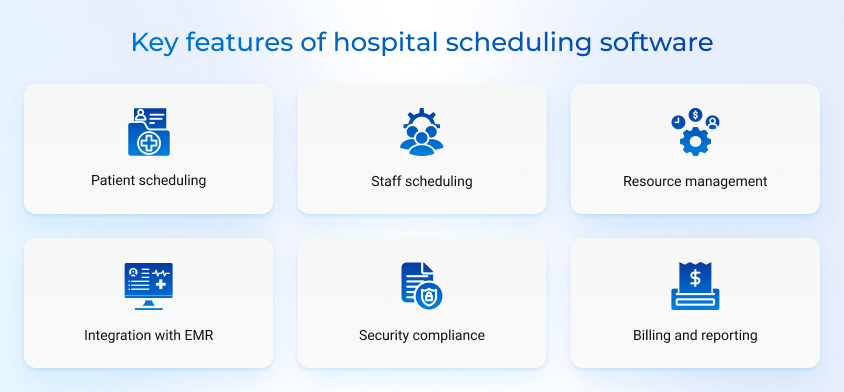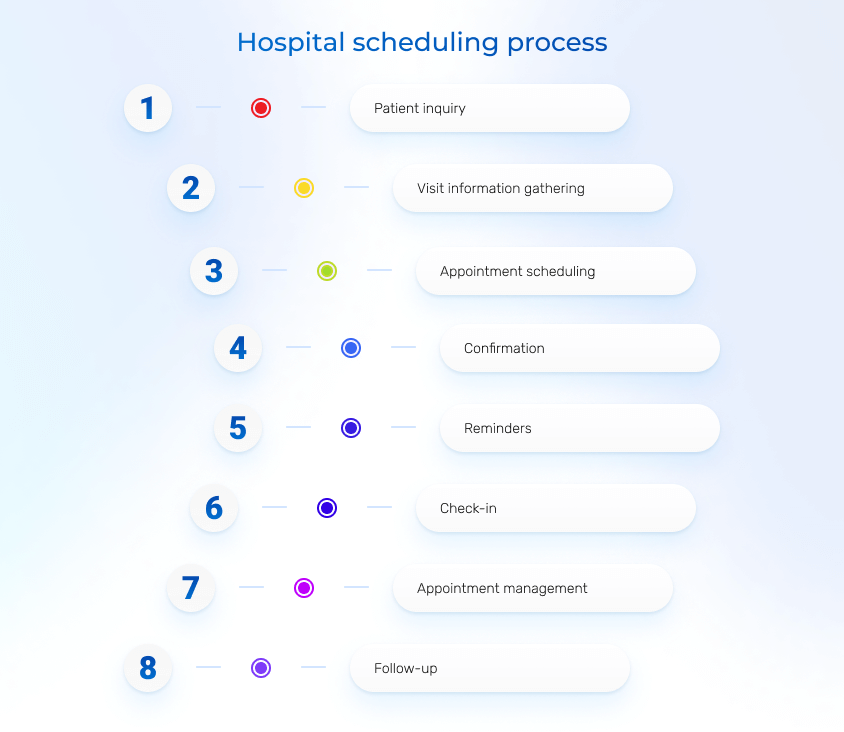
How do hospitals approach appointment scheduling? What are some good practices to apply? Check this blog post on the usage of hospital scheduling software and what benefits it can bring to your health facility.
List of the Content
- What is hospital scheduling software?
- How can a hospital scheduling process be effectively arranged?
- How to use hospital scheduling software?
- What are benefits of using hospital scheduling software?
- Conclusion
WHAT IS HOSPITAL SCHEDULING SOFTWARE?
It goes without mentioning that timely medical services always determine the quality of health care. Poor time management often leads to work overload and inconsistent patient flow, so the health facility looks for ways to deal with these disturbing aspects. The common solutions involve introducing the best approaches in appointment scheduling and hospital management.
It is almost impossible to provide value-based and timely care without technology adoption. With the wide variety of digital tools, healthcare providers draw their attention to the latest market products and their efficiency within hospital operations. According to the statistics, the medical scheduling software market is expected to grow to $74.87 million by 2030.
Let’s find out what makes hospital scheduling software so demanded.
Designed to optimize the scheduling process, this software identifies ways of booking appointments, managing schedules, and coordinating resources. The distinctive feature is that health facilities can’t simply use the standalone scheduling software. It might work for most organizations, though it won’t work for the healthcare industry.

The decisive aspect is that hospital scheduling software is commonly integrated with other medical practice functionality. It refers to medical records management, billing, patient management, and more. Managing appointments has always been only a part of the required functionality. Scheduling software for hospitals has to protect patient privacy and secure sensitive health records. Therefore, the prioritization of robust security measures and great functionality helps to find the right scheduling solution for hospitals.
HOW CAN A HOSPITAL SCHEDULING PROCESS BE EFFECTIVELY ARRANGED?
Hospital appointment scheduling goes far beyond just a booking process. It’s a common mistake to think of it as a simple task to be completed at the reception desk. The point is that the hospital scheduling process undergoes a set of varying steps, from the initial patient inquiry to the possible follow-up visit.

Of course, additional specifics will be outlined by every hospital’s policies and the type of care delivered. However, there are some proven scheduling practices that most clinics should consider.
- The adoption of advanced hospital scheduling software has become the solution number one in delivering new approaches and methods. While eliminating manual errors, the clinics learn to set up a flexible process to automate the majority of tasks.
- The focus on the real-time availability of healthcare practitioners, patient balance, and timely access to medical care is vital for most facilities. It’s clear that seamless flow is more accessible with real updates on available time slots and resources, including specialists, equipment, etc.
- Another good practice refers to establishing objective appointment criteria. The advanced scheduling tools allow the clinic to give preference to urgent cases, follow-ups, or new patient visits. It builds an efficient workflow to promptly address particular cases.
- Many clinics practice to maintain automated waitlists for cancellations. It enables filling the open slots quickly and optimizing appointment arrangements.
- Automated reminders help inform involved parties about scheduled visits, times and dates, planned procedures, etc. Moreover, such functionality retains patients after appointments for continuity of care and scheduling follow-ups.
- The next thing embraces buffer time implementation. That is extra time allocated to tasks to accommodate delays and unexpected situations. It significantly increases productivity as doctors can reduce waiting times or catch up on previous appointments if required.
- Efficient scheduling always depends on the optimized use of staff and space. Good software coordinates the patient flow with the aligned times for the involved resources, such as practitioners, equipment, rooms, etc.
- Last but not least is security compliance for medical appointment scheduling. The protection of sensitive patient data and medical records has to be consistently delivered within the latest healthcare regulations like HIPAA, GDPR, etc.
Hospital scheduling software integrates multiple features to automate the complex task of managing appointments. It embraces all the required areas and best practices to simplify setting a time and guiding involved parties.
HOW TO USE HOSPITAL SCHEDULING SOFTWARE?
Proceeding with more details about the efficient usage of medical appointment scheduling software, it’s required to make it accessible for all involved parties and remain customized to specific user needs. Authorized users have to be granted software access based on the assigned roles. It is obvious that receptionists won’t need the same functionality as doctors do.
Therefore, we’ve decided to approach the subject of using scheduling software in hospitals while specifying the typical user roles. From practical experience, the system is commonly utilized by doctors, receptionists, nurses, and administrators. Each role greatly contributes to the efficiency of the scheduling process and shared collaboration to its smooth completion.
Doctors
- View schedules
- Manage availability
- View patient records and appointment details
- Add, reschedule, and cancel appointments
It can be easily referred to as a personal assistant to many doctor’s tasks. Medical practitioners log in to set and view their daily schedule, check patient appointments, and adjust availability with a few clicks. Real-time updates help with managing visits and accessing patient information whenever required. This exceptional functionality makes them fully involved and provides care at the highest service level.
Receptionists
- Book visits
- Manage schedules
- Handle cancellations
- Manage live queue
Being in charge of appointment scheduling, receptionists need functional software to transform their routine tasks into an efficient process. They organize every doctor’s schedule, manage patient flows, and find open slots at request. It can considerably shorten wait times, balance busy schedules, and make care accessible right on time, every time.
Nurses
- Check daily schedules
- Collect vital signs
- Update patient records
- Assist the patient flow
Scheduling software allows nurses to see the daily appointment flow. They can check which patients are scheduled to visit, what procedure to receive, and what doctor they are assigned to. It’s also an efficient tool for preparing for patient visits, collecting vitals, and coordinating with doctors and other medical staff like lab specialists. Digital coordination brings new functionality to assist the real-time care process and prioritize the needs of both patients and doctors.
Administrators
- Manage overall schedules
- Set appointment booking standards
- Manage resources
- Generate reports
The clinic administration often uses the scheduling systems to oversee different aspects of the hospital operations. It’s preferred for exceptional convenience, as many core functionalities are just a click away. Software considerably simplifies their workload as it allows administrators to quickly adjust resources, cover reporting, and oversee the allocation of appointments. Besides, it works perfectly for configuring the appointment rules through assigned roles and granted permissions.
This type of software is an undeniable component in setting up the scheduling process to the total efficiency and convenience of your hospital staff. It supports complex multi-departmental schedules and keeps all of your staff involved. The main point is to find the right hospital scheduling software that can meet the needs of your health facility. As a rule, most software providers offer comprehensive guides and tutorials to simplify the adoption and usage within your hospital workflow.
Are you looking for an advanced scheduling system for your clinic?
Check out LinkHMS with the advanced scheduling module for the health facility of any specification.
WHAT ARE BENEFITS OF USING HOSPITAL SCHEDULING SOFTWARE?
If you are still looking for additional reasons to use hospital scheduling software, your health facility lacks the opportunity for real advantages. Have you ever considered that simplified scheduling tasks can really boost efficiency and improve healthcare services? This list introduces the benefits of efficient scheduling with advanced software for hospitals and clinics.
- Improved patient experience. Your patients will never favor lengthy scheduling, few open time slots, or long waiting lines. Hospital scheduling software deals with these challenges and brings exceptional convenience to patients.
- Time management. No gaps between appointments or overbooking allow your clinic staff to allocate time more optimally. It also contributes to better productivity and optimized staff scheduling.
- Increased efficiency. Manual scheduling errors, double booking, and missed appointments are reduced by using visit scheduling software. That greatly helps with rescheduling and managing cancellations.
- Better record-keeping. The advanced scheduling functionality can eliminate the risk of lost or inaccurate records. It normally integrates with the EMR systems to make the visit history accessible, up-to-date, and, of course, linked to other patients’ medical records.
- Efficient communication. Miscommunication can easily lead to scheduling conflicts and missed appointments. The adoption of the software enables real-time updates, appointment statuses, and schedule changes to keep healthcare professionals and patients informed and connected.
Therefore, it gets easier to discover significant advantages in clinic management. Establishing a more organized hospital environment with a centralized platform is a good practice to be used for every facility.
CONCLUSION
One of the main reasons to use hospital scheduling software is to increase the efficiency of your hospital’s daily workflow. Medical appointments won’t seem that complicated as long as your facility embraces such aspects as full-fledged software functionality, precise coordination, and robust security. There are a number of good practices to be adopted within your clinic to reach optimized resource allocation and patient satisfaction.
FAQs
What is hospital scheduling software?
This type of software automates the medical appointment scheduling process, including resource allocation, schedule management, time tracking, staff allocation, and, of course, patient scheduling.
How does hospital scheduling software work?
Health facilities adopt this software to optimize the use of resources and time. It helps to guide your patient and staff through the entire scheduling workflow while covering the needs of every involved party.
Why is the usage of appointment scheduling software significant?
It’s an excellent opportunity to plan your medical appointments while prioritizing the needs of your patients and staff. The system plays a vital role in allocating time slots in a way the clinic prefers. It obviously results in reduced wait times, well-organized workflows, and satisfied patients.


